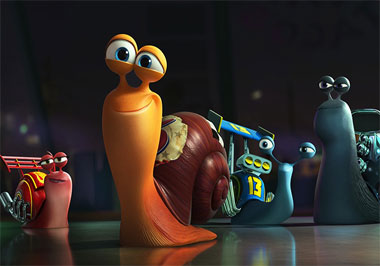In the past couple of years, Dreamworks Animation has made a shift from movies like Shark Tale and Shrek to higher-quality works like Kung Fu Panda (sequels excluded), the hugely underrated Megamind, and How To Train Your Dragon, which garnered a near-Pixar 98% "Certified Fresh" score on Rotten Tomatoes. In fact, the rise of Dreamworks seemed to coincide almost perfectly with Pixar's micro-fall from public graces: Cars 2 was widely panned, Brave was widely criticized as being good but somehow not very Pixar, and the movie studio canceled several in-development new properties while renewing older films for sequels.
It seemed for about six months, after 2012's Brave marked Pixar's second underwhelming film in as many years, that Dreamworks Animation could overtake Pixar, if not in quality then just in sheer public goodwill. It was hard for Dreamworks to disappoint people when nobody expected anything, and the exact opposite was true for Pixar.
Well, to anyone else who follows the vacillating fates of Pixar and Dreamworks Animation like most people follow sports teams: it was a fluke, guys, we can go on home. Turbo is a staggeringly average showing for the studio, as shallow and transparently message-laden as anything Dreamworks Studios has produced in years.
(There is one bright spot, though: a running joke about crows unexpectedly snatching snails and flying off with them, presumably to the snails' doom, got the hardest laughs from me. But notably, none of the children in the theater seemed to agree with me.)
 DreamWorks / 20th Century Fox
DreamWorks / 20th Century FoxThe film centers around a snail named Theo (voiced by Ryan Reynolds) who dreams of racing in the Indy 500. After a pleasantly surreal encounter with a car engine full of NO2, Theo is granted super-speed, rechristens himself Turbo, and sets out trying to achieve his dreams. Because, as the movie repeats over and over, "No dream is too big, and no dreamer too small." (My apologies if my summary of the movie is almost word-for-word identical to those you'll find on other sites, but the movie just isn't complicated enough to mention anything else.)
The movie is filled with the kind of star-studded cast that's become problematically typical of Dreamworks animated movies, but I'm not going to list anyone besides the near-unrecognizable Bill Hader (who plays Guy Gagne, Turbo's inspiration-turned-competition), because none of the stars get more than 30 seconds of dialogue—in fact, one could almost cut the movie down to a five-character show and lose nothing. Bit parts are there to pad length and turn familiar, likable voices into goodwill for the movie, like in the case of criminally-underused Maya Rudolph (who, in a weird note, is listed on every synopsis I've read as being Turbo's love interest, despite the fact that this is definitely not true).
However, the movie can definitely be enjoyed by six-year-olds who want to watch a snail go fast. It's free from the problems of sexual and gastrointestinal references that turned parents off to movies like Shrek. It is not too long. All around, it's not worth seeing in theaters, but I guess there's no reason to actively avoid it.
But I also think Turbo has some core structural problems that make it a problematic watch—not necessarily bad for kids, but definitely not a True movie—and there are much better movies to watch that deal with questions of minor figures achieving great things.
The problem with underdog stories is that they will almost always inevitably become overdog stories—either that, or tragedies. Either your main character is triumphant, or fails. Triumph definitionally strips him of any claims to underdogship, and failure makes us as the audience, well, sad, which most movie studios try to avoid. Which leaves you in a weird narrative bind where you need your hero to win, but you also need to reaffirm your hero's status as underdog, because their whole arc has been negatively defined: they're different from the champions because the champions are on top and the hero is on bottom.
 DreamWorks / 20th Century Fox
DreamWorks / 20th Century FoxThe problem with Turbo is that Turbo never earns anything he achieves. His speed is based on a slight variation of the standard "he fell into a vat of acid, now he has powers" that pervades comic books (many of which share this same fundamental problem). The movie's whole plot is instigated by NO2 as deus ex machina, and so how are we supposed to root for Turbo when, in all actuality, he should be the one being de-throned?
See, these kinds of movies are caught in a tension between having their heroes be unbeatable (and thus cool) and vulnerable (relatable). Narratively, it doesn't work when your hero is the best at everything, because it compromises their identity as someone who deserves to succeed based on the strength of their character and fortitude of spirit. Turbo sells you on a message of idealistic victory (Turbo will win because he has the most heart!) and delivers a message of meritocratic victory (Turbo wins because he is just inherently the fastest).
I don't know of anyone who decides what sports team to root for by looking at a ranked list and picking the #1, whose favorite players are just whoever is voted MVP each year. As good and fair as they are, a meritocratic approach to narratives—"X will win because they are the best"—is not a compelling one, not one that gels with our innately human desire to see the meek inherit the earth.
Turbo claims to be an underdog, but never is, and so his victories don't mean anything besides reinforcing the idea that the strongest/smartest/fastest will always win. And, to be fair, that's the way life normally pans out: that the most of some category will always succeed. But that's exactly why we need movies to tell us otherwise—to tell us that Rocky can withstand Apollo Creed, or that Rudy can play football, or that the Titans will win and thus be remembered—because we need hope, need to believe that, while right now the strongest and most powerful may beat us, that we have a chance, if we're willing to try.
Caveat Spectator
A couple of snails are snatched away by crows in what's a bit of surprise macabre humor that's jarring juxtaposed with the tone of the movie and may upset some kids. Maya Rudolph's snail and Paul Giamatti's snail get uncomfortably close—nothing inappropriate.











